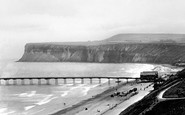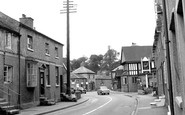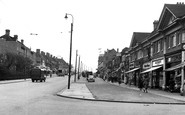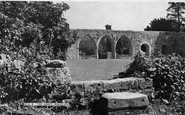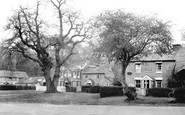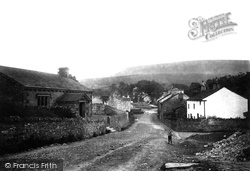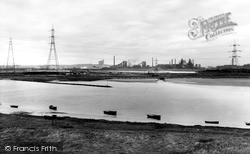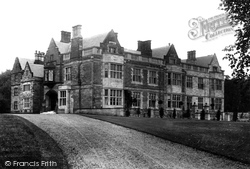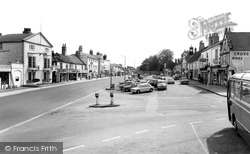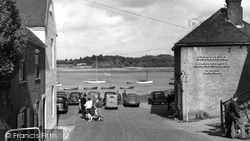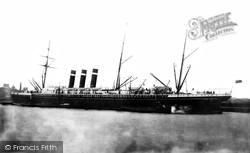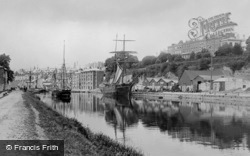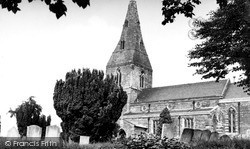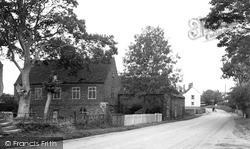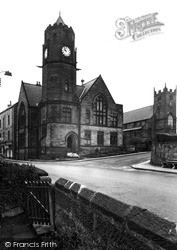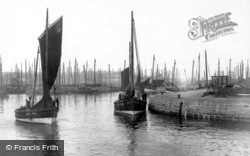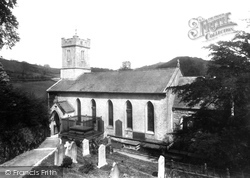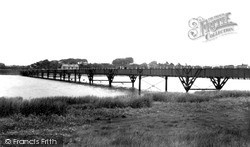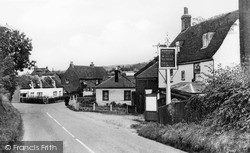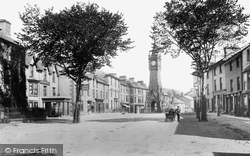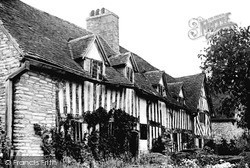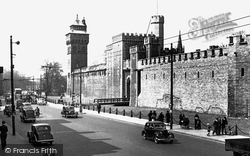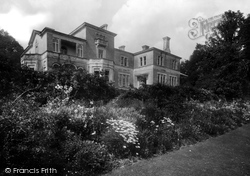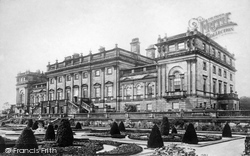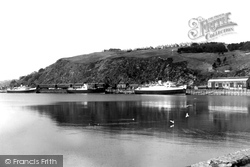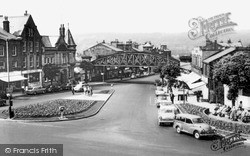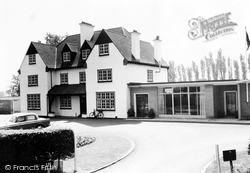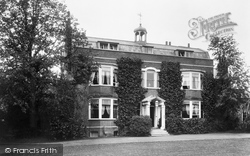Places
18 places found.
Those places high-lighted have photos. All locations may have maps, books and memories.
- Hythe, Kent
- Hythe, Hampshire
- Small Hythe, Kent
- Bablock Hythe, Oxfordshire
- Methwold Hythe, Norfolk
- Hythe, Somerset
- Hythe, Surrey
- Hythe End, Berkshire
- The Hythe, Essex
- Egham Hythe, Surrey
- West Hythe, Kent
- New Hythe, Kent
- Broad Street, Kent (near Hythe)
- Horn Street, Kent (near Hythe)
- Newbarn, Kent (near Hythe)
- Newington, Kent (near Hythe)
- Broad Street, Kent (near Hythe)
- Stone Hill, Kent (near Hythe)
Photos
360 photos found. Showing results 3,821 to 360.
Maps
101 maps found.
Books
10 books found. Showing results 4,585 to 10.
Memories
4,406 memories found. Showing results 1,911 to 1,920.
Huntcliffe Cottages
On this photograph there is a little 'bump' on the horizon just below Warsett. That 'bump' is 3 railway cottages and my Dad lived in No. l with his parents and brother and sister around 1912 - 13ish when he was school ...Read more
A memory of Saltburn-By-The-Sea in 1947 by
70s Triangle
Growing up in Triangle in the 70s, I was the middle child of three children. My dad was Ian Whippey and my grandparents were Arthur and Lillian Whippey. We lived at 18 Rochdale Road, opposite the Triangle Inn, then run by the ...Read more
A memory of Triangle in 1970 by
Forge Farm
Just found this site while looking for Chinley which I believe is close by. Forge Farm memories of the fun times we had as children hop picking with nan and gran-dad, dad and mum, aunts and uncles and of course my siblings. At that time ...Read more
A memory of Goudhurst in 1953 by
Summer Holidays
I was born in Brewery Yard, Great Haywood. After the war my mum moved to Notting Hill, London, so in the summer holidays my sister and I would stay at Nan & Grandads in the village. Mum {Eileen Bailey} played the piano in the ...Read more
A memory of Great Haywood in 1954 by
1970s Allington
I moved to 71 Hildenborough Crescent, Allington, Maidstone, Kent in 1973 aged 10 years old. In the nine years I lived there I saw many changes. Parts of Allington were still being built. There were no houses built in between the ...Read more
A memory of Allington by
Village On A Hill
In 1941, shortly before my sixth birthday, I arrived at what was then a large branch of the National Children's Home & Orphanage, at Old Bramhope. To get there I had enjoyed an exciting (for me) train journey from Kings Cross ...Read more
A memory of Bramhope in 1930 by
Growing Up British
Since my birth coincided exactly with the outbreak of World War II in the September of 1939, my mum must have felt that childbirth was synonymous with calamity; I was Mum's 'war effort'. Home was a semi-detached two-storey house ...Read more
A memory of Burnt Oak in 1945 by
Fletchertown
Like many people who live in Cumbria I come from another part of the country. This is why I am particularly interested in the history of where I now live in Fletchertown. The Fletchertown Community Group is putting together an ...Read more
A memory of Fletchertown by
Chanting At Dusk
My parents were managers of The Montague Arms for a short while. On sunny days I was allowed to cycle to Hythe and back. I was twelve and fit enough to reach Hythe within half-an-hour! I heard rumours from the staff at the hotel ...Read more
A memory of Beaulieu in 1954 by
Overnight Stay...
I stayed at Twin Oaks one night in October 2008. I arrived very late after escaping from some motorway works madness, but my hostess was very welcoming and supportive. She explained that the twin oak at the front of the building is much ...Read more
A memory of Cadnam in 2008 by
Captions
4,899 captions found. Showing results 4,585 to 4,608.
The name Downham means 'dwelling by the hill' - the hill is obviously Pendle, which can be seen in the background.
The production of steel was reaching the end of its competitive life by the time of this photograph, and within a couple of decades the industry was to be transformed - and greatly reduced.
Comparison of this view of Gisborough Hall's south front with that of Long Hull in 1891 shows clearly the extent of the alterations and extensions, which are particularly apparent by the areas
This town on the old Great North Road was specifically created to trade on its location by the local landowner Idonea de Viponts as early as the 12th century, when the existing Roman road was diverted
In the 1960s formation sailing was performed by the light of coloured searchlights. Today, Hamble Week promotes local produce.
By the late 1870s, the line was facing tough competition from Cunard, White Star, Dominion, and the Guion Line; Inman's problems were further compounded in 1881 with the loss of the 'City of Brussels
Exeter's canal was built at the request of the city's Tudor merchants and traders, who were exasperated by the weirs on the River Exe that obstructed the free flow of water transport into the city.
It is the 12th- and 13th-century work which raises All Hallows' above the ordinary, but the restoration of 1874 by the uninspired Cambridge architect W M Fawcett did little to enhance the interior
Saltfleet lies just behind the dunes, but is a remnant of the medieval town and port a little further east, long washed away by the sea.
It was designed by the architect E R Robson of London, who also designed the nearby Lodge of Loftus Hall.
The masts had no standing rigging, being supported by the sail halyard and burton stay tackle. Note the mast on PF114: at deck level it appears to be at least two feet thick.
The memorial now stands by the Grange road, and John Wilkinson was transferred to the churchyard.
The two townships of Poulton-le-Fylde and Hambleton, linked by the bridge, were villages when the bridge was first built to serve agricultural communities.
Up to the time of Dr Beeching's 'axe', its station at nearby Mardock was served by the single track Buntingford Branch railway line which also ran through the villages of Widford, Hadham, Standon, Braughing
The clock was erected in 1873 by the Marquis of Londonderry to celebrate his son's coming of age.
The house was acquired by the Shakespeare Birthplace Trust in 1930 and furnished as it would have been in Mary's day. Millions of tourists have visited it since.
The castle has a long pedigree, with some remains of the Roman period imbedded within the structure, but the whole medieval core was systematically upgraded by the 3rd Marquis of Bute and his architect
She described herself as 'a desperate walker', but her eagerness was constrained by the necessity to be 'fussy and correct' in ensuring that she set off wearing the right attire.
The medieval manor house, Gawthorp Hall, was bought by the family, and John Carr was asked to design the new stables block.
The Great Western Railway (GWR) steamers seen alongside the harbour have now been replaced by the Irish ferries operating from Goodwick. Warehouses can be seen centre and on the right.
By the time this photo was taken the railway had closed. The Beeching plan axed the Otley to Skipton line via Ilkley with the final through train on Saturday 20th March 1965.
Gifford House, used as its offices by the BDC, was built in 1924 for the rector of Bowers Gifford, who used it as a college for coaching students for the universities.
Thus Fareham originally meant 'house in the ferns' or 'homestead by the ferns'.
This red-brick Georgian house, with bay windows and surmounted by a small white cupola, was coveted by the author Charles Dickens ever since he was a boy living at Chatham; he often passed it on long
Places (18)
Photos (360)
Memories (4406)
Books (10)
Maps (101)



